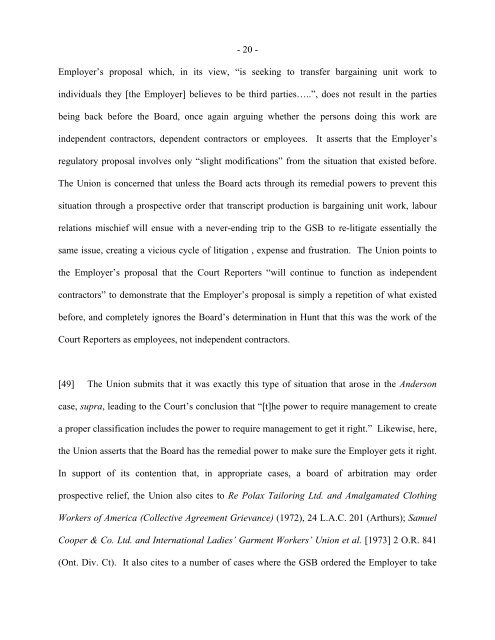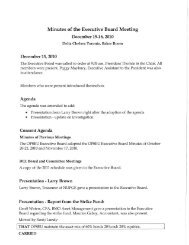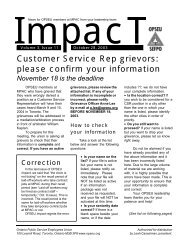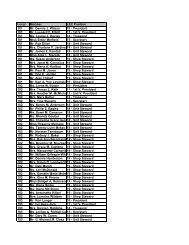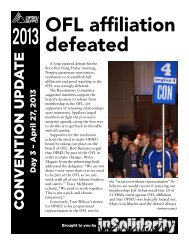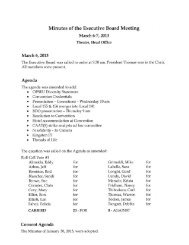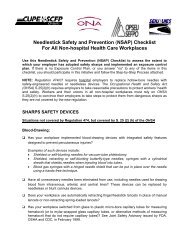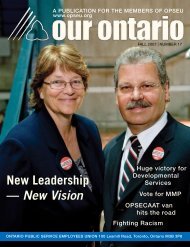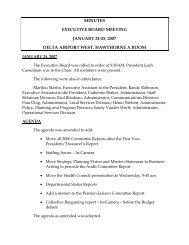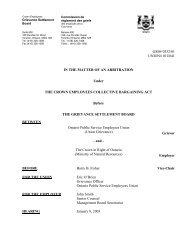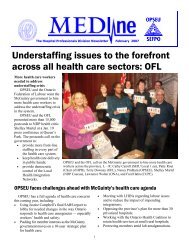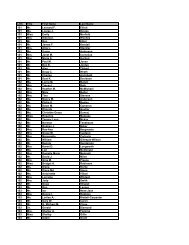2009 - OPSEU (Hunt et al) and Ministry of Attorney General, GSB ...
2009 - OPSEU (Hunt et al) and Ministry of Attorney General, GSB ...
2009 - OPSEU (Hunt et al) and Ministry of Attorney General, GSB ...
- No tags were found...
You also want an ePaper? Increase the reach of your titles
YUMPU automatically turns print PDFs into web optimized ePapers that Google loves.
- 20 -Employer’s propos<strong>al</strong> which, in its view, “is seeking to transfer bargaining unit work toindividu<strong>al</strong>s they [the Employer] believes to be third parties…..”, does not result in the partiesbeing back before the Board, once again arguing wh<strong>et</strong>her the persons doing this work areindependent contractors, dependent contractors or employees. It asserts that the Employer’sregulatory propos<strong>al</strong> involves only “slight modifications” from the situation that existed before.The Union is concerned that unless the Board acts through its remedi<strong>al</strong> powers to prevent thissituation through a prospective order that transcript production is bargaining unit work, labourrelations mischief will ensue with a never-ending trip to the <strong>GSB</strong> to re-litigate essenti<strong>al</strong>ly thesame issue, creating a vicious cycle <strong>of</strong> litigation , expense <strong>and</strong> frustration. The Union points tothe Employer’s propos<strong>al</strong> that the Court Reporters “will continue to function as independentcontractors” to demonstrate that the Employer’s propos<strong>al</strong> is simply a rep<strong>et</strong>ition <strong>of</strong> what existedbefore, <strong>and</strong> compl<strong>et</strong>ely ignores the Board’s d<strong>et</strong>ermination in <strong>Hunt</strong> that this was the work <strong>of</strong> theCourt Reporters as employees, not independent contractors.[49] The Union submits that it was exactly this type <strong>of</strong> situation that arose in the Andersoncase, supra, leading to the Court’s conclusion that “[t]he power to require management to createa proper classification includes the power to require management to g<strong>et</strong> it right.” Likewise, here,the Union asserts that the Board has the remedi<strong>al</strong> power to make sure the Employer g<strong>et</strong>s it right.In support <strong>of</strong> its contention that, in appropriate cases, a board <strong>of</strong> arbitration may orderprospective relief, the Union <strong>al</strong>so cites to Re Polax Tailoring Ltd. <strong>and</strong> Am<strong>al</strong>gamated ClothingWorkers <strong>of</strong> America (Collective Agreement Grievance) (1972), 24 L.A.C. 201 (Arthurs); SamuelCooper & Co. Ltd. <strong>and</strong> Internation<strong>al</strong> Ladies’ Garment Workers’ Union <strong>et</strong> <strong>al</strong>. [1973] 2 O.R. 841(Ont. Div. Ct). It <strong>al</strong>so cites to a number <strong>of</strong> cases where the <strong>GSB</strong> ordered the Employer to take


